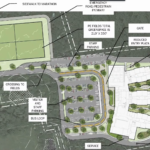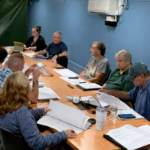The Conservation Commission at its in-person meeting Tuesday night unanimously approved the notice of intent that would allow construction of the next development phase of The Trails to proceed, but it decided to table a discussion of how to resolve previously assessed fines.
The Trails, an 80-unit open-space mixed-use development (OSMUD) off Legacy Farms North Road, between Wilson Street and the Ashland border, has been plagued by stormwater management issues that have negatively impacted the water system in Ashland, and violations were issued in the summer of 2021. Both the Conservation Commission and the Planning Board have been seeking plans to remedy the situation over the past several months. A peer consultant was brought in to review the stormwater management practices.
Project engineer Peter Bemis explained that the work he is presenting is the last component needed to “tidy up” the off-site work. Originally, one proposed stormwater basin was planned to discharge into an intermittent channel along the lagoon driveway at the Ashland border. But a nearby culvert that runs into the channel was not on previous plans and directed additional water in the direction of the border. He said that a riprap embankment at the culvert was constructed in the 1990s there “without review or approvals,” and it negatively impacted his work.
“What we’re trying to do is design it for 8.7 inches of rain,” he said, not the 2.5 inches of rain that the system was designed to handle. The reason for this was that the impact of unprecedented storms nearly 18 months ago caused water to flow into Ashland’s reservoir. Ashland recently approved the removal of the culvert so that it can be redesigned as an open channel, Bemis said.
While he is concurrently performing mitigation work in Ashland, Bemis explained that Ashland actually owns the land in Hopkinton that the notice of intent addresses.
Said Bemis: “It’s been challenging because the calculations tell you one thing, and then from the field …”
A channel with a 4-foot bottom will be constructed up to the resource area, he added. A water conveyance system also is planned to bring the water to the wetlands area.
In addition to the engineering work, Bemis proposed adding “transitional plant material” such as inkberry to improve the look of the site.
Bemis noted that his firm has done a lot of survey work on the site and has “found things all over the place” that don’t appear to have been documented previously.
“There’s monuments,” he said. “We found old town bounds out in the woods.”
As a result, Ashland has decided to “jump on our work.”
Bemis thanked the commission members for their patience during this long and arduous process.
“One good thing that has come out of this is, if it hadn’t have been for these rain events, we may not have ever had to have these meetings,” he said. “But what we did find is that the infrastructure was not sufficient to support the project.”
He mentioned that the lagoon driveway, although not permitted, is there.
Added Conservation Administrator Kim Ciaramicoli: “It’s an area that has historically seen changes, and there’s been a lot of construction ad hoc down there.”
Commission members agreed that Bemis’ work has improved the area. The basin will be completed, Bemis stressed, and the off-site improvements have been made. Bemis asked that the fourth phase of development begin now because of the weather.
A condition was placed that the second half of the proposed housing units could not be completed until the stormwater work is completed. Barnes said this was “a fair compromise.”
Said Bemis: “We’ve come a long, long way.”
Ciaramicoli also explained that fines previously assessed have not been paid, with the exception of $6,000 in fines assessed in 2018 and paid. Currently, there has been $41,300 in fines assessed but not yet paid for violations and missing stormwater pollution protection plan (SWPPP) reports. The commission decided to table that discussion to consider the cost of the mitigation work Bemis is performing.
Chair Jeff Barnes suggested that the discussion be tabled so that the commission would “not make a rash decision,” which evoked some laughter from fellow commission members.
Member Ted Barker-Hook questioned the time frame usually in place for paying fines and was told by Ciaramicoli that it is 20 days.
Said Barker-Hook: “And we are at 19 months, or something like that.”
Ciaramicoli said the extension of time would help to resolve legal issues about fines that can be discussed at the next meeting. The committee agreed.
Legacy Farms mitigation program discussed
The commission also reviewed and unanimously approved an amended order of conditions on mitigation work at Legacy Farms North and South.
Mark Arnold from Goddard Consulting spoke on behalf of the applicant. He explained that as development is nearing completion, an additional 1.9 acres of wetlands were observed on the site when it was re-delineated. The site includes part of the former Weston Nurseries property.
There will be open space preservation of 500 acres of the 700-acre site that accounts for more than 70% of the land, Arnold noted. Native plantings have been added to bolster the current vegetation, as well as wetlands replication work.
Because there has been planting and wildlife habitat restoration work, he asked that the commission not monitor invasive species encroachment annually for five years as previously proposed. Instead, he proposed that the site be monitored for two years, with the remaining three years being performed on a year-to-year basis. The applicant will pay for Lucas Environmental to monitor and review the site.
There has been invasive species management and bank enhancement as part of the project, Arnold said. No knotweed has been found, which had been a concern. If it is, Arnold said it would be handled by stem injection, which he said the commission could add as a condition.
Said Arnold: “Our goal would be to be particularly aggressive in the first two to three years, because our goal would be to try to have success early on.”
The plantings, Arnold said, could be purchased next week, and work would be completed by the end of spring.
Tennis player seeks permission for court
Parnaz Kaur, a sixth grader at Hopkinton Middle School, presented a request to the commission alongside her father, Harpreet Singh, for a tennis court to be built at her home at 42 Greenwood Road.
“I am very passionate about tennis,” the 11-year-old explained, “and my dream is one day to represent both Hopkinton and the United States at the U.S. Open and other Grand Slam events.” She recently trained at a Florida tennis camp under the tutelage of the coach of tennis legend Pete Sampras, besting “much older players,” she said.
“In order to achieve my dream of playing at the pro level, I need to train six hours a day,” she explained. “However, currently, in Hopkinton, we only have five tennis courts for 18,000 residents. Whenever I am at the public tennis courts outside my school, it is a long wait and often I go home without playing.”
Kaur has attempted to book playing time at Westboro Tennis & Swim Club, but there are not always courts available. In order to keep up her training schedule, she proposed that her family “build a court in our backyard.”
She added that her family is sensitive to environmental concerns and has 46 solar panels on the house roof that generate most of the home’s electricity. According to EPA estimates, she said, the home’s use of clean energy over the past four years “is equivalent to planting 600 trees, saving 80,000 pounds in CO2 emissions so far.”
Said Barnes: “That’s a great dream that you have.”
Consultant Paul McManus, the founder of EcoTech Consulting Services in Worcester, spoke on behalf of the applicant. He was hired to delineate wetlands on the site. He said the site is “relatively flat,” but some grading work would need to be performed to keep the tennis court out of the 50-foot no-disturb zone. There would be a 10-foot wall, which was a point of discussion.
One issue with the property, he explained, was a substantial retaining wall around the back of the house, which Singh said he had to restore. The only way for construction vehicles to work would be to get an easement on Hopkinton Area Land Trust land. HALT has reviewed and signed the notice of intent, McManus said.
Barnes raised the environmental concern that the tennis court is impermeable and suggested new plantings to compensate for it.
Singh said he had proposed building a court in 2020 under previous Conservation Administrator Don McAdam, but he said “the commission intervened.” He purchased the home in 2016. After stabilizing the site, partially at HALT’s request, he decided to file a notice of intent.
He also noted that part of the road there actually is on his property.
Ciaramicoli requested that there be “a more substantial restoration of the buffer zone” up to the 25-foot buffer of the delineated wetland.
Barker-Hook expressed concerns about water running off behind the proposed tennis court off the wall at a 10-foot drop onto an impermeable surface, noting the potential velocity of the water.
McManus explained that the wall is stepped and water can “weep through.”
Ciaramicoli recommended that a professional engineer stamp the plan before the commission votes. Board members concurred and asked to delay the vote until a future meeting.
Barnes said it “should be a permittable project” at the next meeting on April 25.
Commission approves Elm Street warehouse
The commission approved a proposal for a “flex storage warehouse” at 86 Elm Street with associated site work after discussion about stormwater management at the site.
Senior project manager Michael Dryden spoke on behalf of the applicant. There are five other buildings on the 7-acre site that screen the proposed warehouse. The proposed drainage system is being reviewed by town engineering consultant BETA Group after its repeated requests for one. Dryden said the application is “poised” for Planning Board approval of the site plan and stormwater management plan at its next meeting on April 24.
Dryden said that there is an infiltration system proposed at the front of the building. He did not look for other ways to improve the site, although Barnes suggested country swales or a rain garden be considered.
The stormwater situation has been “a sore subject,” he added. The project initially was designed to be “well below 1 acre” so that it would not trigger a stormwater management plan. The Fire Department requested a 20-foot access way, which put it “very close to the bubble.”
Said Dryden: “The Planning Board’s consultant refused to accept that.”
He then “decided to concede” after several meetings and filed a stormwater management report after five requests were received by BETA.
Commercial rock climbing at College Rock approved
The committee approved a proposal to hold instructional courses and group rock climbing sessions at College Rock. Daniel Vickers, the owner of and head instructor at the Greater Boston Climbing School, presented the proposal, which prompted a discussion about a company profiting off of a town natural resource.
Earlier this year, Vickers appeared before the Conservation Commission, the Parks & Recreation Commission and the Planning Board with his request. He is a member of the American Mountain Guides Association and is insured.
The College Rock property is under the purview of the Conservation Commission, Ciaramicoli previously said, and a conservation restriction has not been placed on it.
She said that this venture is “a little bit grayer” than she originally anticipated. Currently, there is no policy in place for using public lands for paid services. Members debated establishing a policy with permitting conditions.
“The interesting thing is that Parks & Rec doesn’t tend to rent facilities to out-of-town groups,” Ciaramicoli added.
There also were questions about liability if someone were injured, as well as the establishment of an account for fees collected through Town Meeting.
The committee decided to allow rock climbing groups to use it on a trial basis without collecting fees to see if it is viable. REI, which has been using the site without permission, will be approached.






















Over the past few months I have been noting that while the Conservation Administrator Kim Ciaramicoli’s job is to be a neutral party in these hearings, she behaves like a voting member and influences the decisions of the Commission and its members all appear to be helpless.